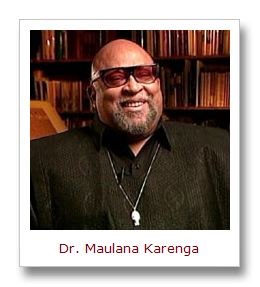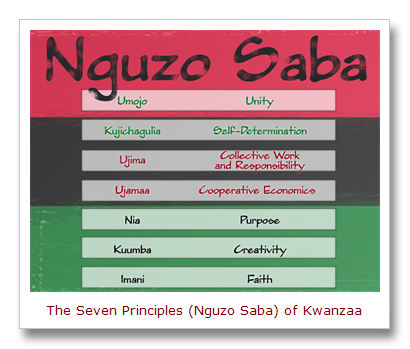Kwanzaa is a Swahili word that entered the American lexicon in 1966.
It’s the name of the African-American holiday celebration that starts on December 26 and lasts for seven days.
Kwanzaa was created by Dr. Maulana Karenga, a professor and Chairman of the Department of Africana Studies at California State University at Long Beach.
After the terrible 1965 Watts riots in Los Angeles, Karenga wanted to find a new way of bringing African-Americans together as families and as a community.
His research on traditional African “first fruit” harvest ceremonies gave him the idea for Kwanzaa. And, on December 26, 1966, he organized and launched the first Kwanzaa celebration.
Karenga took the name from the Swahili phrase matunda ya kwanza, which means “first fruits.”
He then mixed together and adapted several African traditions to devise the week-long Kwanzaa celebration — becoming one of the few people in history to establish a whole new holiday tradition. Today, Kwanzaa is observed by millions of people of African descent in America, Canada and other countries.
Since Kwanzaa is a cultural, rather than a religious holiday tradition, many of them celebrate both Christmas and Kwanzaa.
On each night of Kwanzaa week, families join together to light one of the seven candles on a special candleholder (called the Kinara), and discuss one of Seven Principles (Nguzo Saba) that Dr. Karenga designated as important to honoring their shared African heritage and strengthening family and community bonds.
In English, those seven principles are: unity, self-determination, collective work and responsibility, economic cooperation, purpose, creativity, and faith.
I’ve heard some people scoff at Kwanzaa.
And, I know that – like many other leaders at the forefront of black activism during the turbulent 1960s and 1970s – Dr. Karenga has a controversial past (see the Wikipedia entry about him).
But it’s hard to dispute the fact that the principles he designated for African-Americans to focus on during Kwanzaa are worthy values for any family or cultural group to think about and celebrate.
Happy Kwanzaa!
* * * * * * * * * *
Comments? Corrections? Post them on the Famous Quotations Facebook page.
Related reading and listening…



